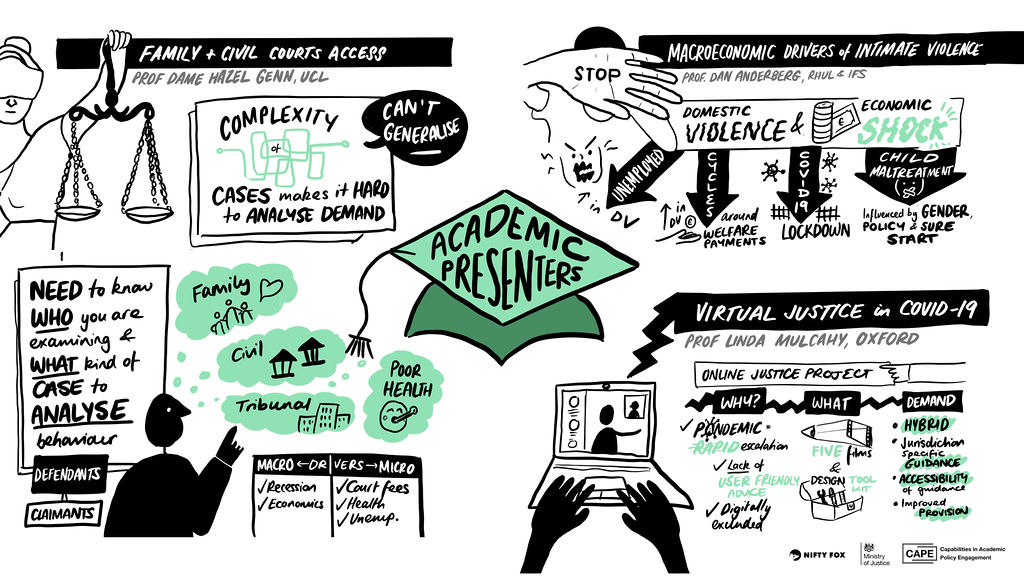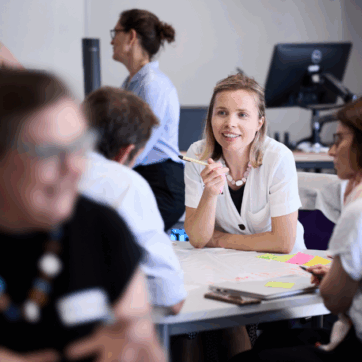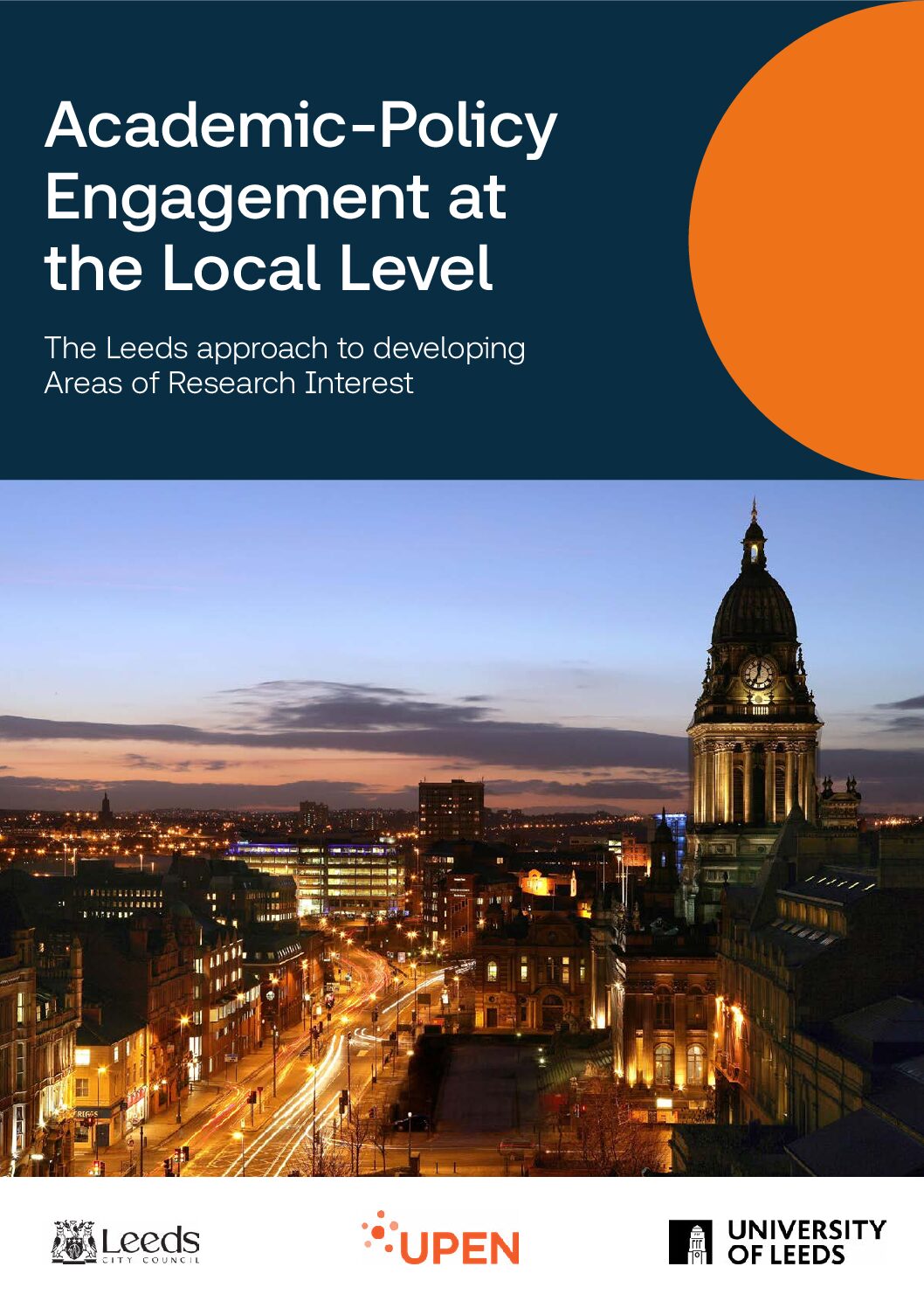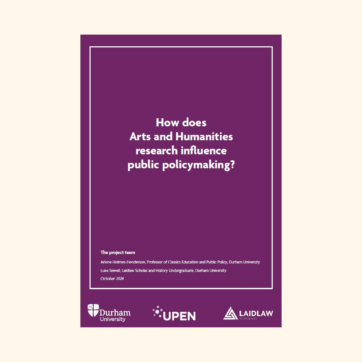Context
January 2022 feels a lot like January 2021 and, pessimistically, I’m wondering where the last year went as I write this from home. However, I’m more optimistic about the CAPE-MoJ partnership following a year of promising activity and lots to look forward to in the coming 12 months.
The Evidence and Partnerships Hub exists to enhance MoJ’s strategic research capabilities by collaborating with academic experts, research networks, and research funders, to address departmental evidence priorities. My colleague Amy talks more about the Hub in the latest CAPEcast and in this recent blog post I place our partnership with CAPE in a wider context alongside our other strategic activities.
The Hub has a clear purpose and aims but we’re constantly learning how to achieve them effectively and sustainably. We’re a relatively new team and strategic knowledge exchange – from inside government – is a growing discipline, so there’s lots to learn. This explains why our partnership with CAPE is critical, as it’s allowing us to test different mechanisms and activities to see what works.
Partnership to-date
We started from a relatively blank sheet of paper, without specific topics we wanted to explore, activities we wished to undertake, or research objectives we hoped to achieve. Instead we committed to collaborate for a year to see what we could learn. This differed from past MoJ academic engagement that was generally topic-specific, research objective-focussed and timebound. The degree of freedom that CAPE provides has allowed us to approach the situation rigorously, building from the ground up and developing activities in response to need.
The beginning of the partnership came shortly after publication of the MoJ Areas of Research Interest (ARI) 2020 and this provided a natural structure around which to begin engagement activities. We began with a sandpit event, bringing together 50 attendees from MoJ, its arm’s-length bodies (ALBs), and CAPE institutions, to discuss the evidence base underpinning key areas, and generate ideas for subsequent collaboration to address some of the critical gaps. Three emergent areas requiring new, updated, or more robust evidence were identified:
- Drivers of court demand
- Sentencing disparities
- Reoffending outcome measures
For each area we held a bespoke follow-up session with MoJ and Arms Length Bodies’ (ALB) colleagues, to scope what activity – using which CAPE mechanism – would best address the relevant evidence gap. This differed for each, based on the type of evidence and expertise required.
We formalised each area into a research strand of the partnership with both an MoJ and ALB partner: Her Majesty’s Courts and Tribunals Service (HMCTS) for courts; the Sentencing Council for sentencing; and Her Majesty’s Inspectorate of Probation for probation. This approach is allowing us to capture the research needs of those close to the (upstream) development of policy at the heart of MoJ, with those further downstream that are closer to implementation and beyond.
For the courts strand we recently held a knowledge exchange symposium (see ‘in focus’ below) to explore the evidence of the factors that drive (family and civil) court demand.
In focus: Courts Symposium
As part of the courts strand, we held a short symposium bringing together 30 attendees from the MoJ Data and Analysis Modelling Hub, the HMCTS Insight and User Research Team, and academics from CAPE-affiliate universities. We also collaborated with a live illustrator to bring the session to life and capture it in visual form (see below).
The symposium explored the evidence on micro and macro level drivers of demand in the civil and family courts, likely future trends against the context of Covid, and the effectiveness of dispute resolution. Three academic speakers presented the evidence on these themes and we facilitated a lively discussion of the issues:
- Professor Dame Hazel Genn highlighted the complexity of the evidence base and the interlinked nature of different drivers of legal problems – particularly work and health
- Professor Dan Anderberg presented (national and international) research on assessing the impact of macro and micro level economic shocks, as well as the impact of lockdown on domestic abuse and child maltreatment
- Professor Linda Mulcahy shared findings from ongoing research on ‘virtual justice’ during Covid-19, exploring the effect of remote and hybrid hearings.
Professor Anderberg’s work has real potential to inform modelling, drawing on a range of different data sources and methods to predict court demand and impacts of different internal (policy) factors and external drivers. We are pursuing collaborative research using CAPE seed funding to explore how new methodology and data can transform our practices and understanding.

For the sentencing and reoffending strands we have launched two policy fellowships, to embed researchers within MoJ and its ALBs, to build the evidence base through collaborative research – more information can be found online. We’re excited to have facilitated these opportunities and look forward to what we can learn from them – both in terms of the research findings as well as the workings of fellowships as a knowledge exchange mechanism.
We’re at the cusp of delivering research that will shape and inform government policy via new and exciting ways of working. Figuring out exactly what works throughout this process will be key to embedding sustained practices that ensure strategic knowledge exchange is a success, but we’ve learnt a lot already to get to this point.
Reflections on knowledge exchange
All CAPE collaboration, engagement, and events have been online (so far), with both positive and negative points. This forced us to establish a joint SharePoint and Teams page to collectively work on shared documents, reducing reliance on email. This has been game changing – particularly the instant messaging feature – and allowed a streamlined sense of team working that makes it feel like we’re in the same organisation. With online-only events it’s hard to get a sense of the levels of peripheral engagement and unstructured encounters, but in many ways this is mitigated by our commitment in partnering with CAPE.
I’ve attended plenty of (in-person) research engagement workshops in the past, and they’re great, but it can be hard to keep momentum after the event and follow through with discussion and ideas. With CAPE this has been different because we had committed to longer-term collaboration and knew we had the support of CAPE resource and mechanisms to drive activity.
For the courts symposium, we thought carefully about the agenda and format to ensure it was a productive use of (online) time. We consciously limited the event to two hours, to aid concentration, and made certain within-event items a prerequisite, to focus the collaborative time. This included a briefing document with an introduction to people, teams, and evidence requirements, allowing presenters to tailor their material to the audience and providing more time for discussion. All these considerations made the event a success, ending with a clear direction and next steps.
We’ve held a variety of knowledge exchange events of different formats and sizes: from the sandpit (>50 people), to generate ideas; the symposium (30 people), to broadly discuss the evidence on a topic; and bespoke follow-up discussions (<10 people), to discuss specific research and methods in detail. Whilst we’ve structured bigger events so that everyone gets a chance to speak, it’s not uniform and smaller events seem to provide an environment more conducive to openness.
Key principles of the collaboration
Openness is important, and CAPE have a strong focus on equality, diversity, and inclusion (EDI) generally. This resonates with our aim to provide engagement pathways regardless of academic or broader (protected) characteristics. By building good EDI practice into events, CAPE aims to provide a positive environment and break down barriers to engagement. However, even though we’ve collected EDI data at events and requested feedback on how they have worked, it’s clear that this is not enough. We still need to do more to fully understand barriers so that they can be overcome, making policy engagement more inclusive.
Only by taking the time to plan, implement, monitor, and evaluate activity, has it been possible to reflect on how it has gone and write this case study. This process itself has provided one final reflection on our partnership with CAPE: it’s taken a year to be at the cusp activity that will deliver research evidence in line with MoJ priorities. I have wondered if that was slow progress, but in outlining the steps we’ve taken and what we’ve already achieved, I’ve come to think maybe not – there is no set precedent for what we are trying to do, and we are learning a lot as we go. We might have ‘delivered’ faster by prioritising a single research strand, rather than three, but CAPE is providing us with the opportunity to test and trial different approaches, and we are making the most of it! Only by having the space to innovate can we fully understand what works for effective and sustained academic-policy knowledge exchange. Here’s to the next 12 months…
About CAPE
Capabilities in Academic Policy Engagement (CAPE) is a knowledge exchange and research project funded by Research England from 2020-2024, which has been exploring how to support effective and sustained engagement between academics and policy professionals. The project is a partnership between UCL and the Universities of Cambridge, Manchester, Northumbria and Nottingham in collaboration with the Government Office for Science, the Parliamentary Office for Science and Technology, Nesta and the Transforming Evidence Hub.
About CAPE case studies
CAPE case studies have been written by academics and policy partners on the CAPE project as reflections on their experience of undertaking academic policy engagement. The case studies include explorations of academic placements in policy organisations and vice versa (called Policy Fellowships), partnerships between universities and policy organisations, and collaborative projects between academics and policy partners.


